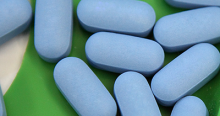HIV: What Is PrEP?
Pre-exposure prophylaxis (PrEP) is a medicine you can take to prevent HIV (human immunodeficiency virus). It works by stopping the virus from taking hold in the body and spreading.
The medicine is prescribed by a health care provider for HIV-negative adults and teenagers who are at risk of getting HIV through sex or drug injection.
Approved oral medicines
There are two oral PrEP medicines currently approved by the Food and Drug Administration:
- Emtricitabine (F) 200mg in combination with tenofovir disoproxil fumarate (TDF) 300mg (Truvada®)
- Recommended for all adults and teenagers at risk for HIV through sex or drug injection.
- Several generic versions are also available.
- Emtricitabine (F) 200mg in combination with tenofovir alafenamide (TAF) 25mg (Descovy®)
- Recommended for adults and teenagers without vaginas who are at risk for HIV through sex.
Approved long-acting injectable medicine
- Cabotegravir 200mg (Apretude®)
- Recommended for all adults and teenagers at risk for HIV through sex or drug injection.
- Learn more about long-acting injectable PrEP and read frequently asked questions (FAQs).
Before starting a PrEP medicine
If you see a health care provider for PrEP, you’ll first have to undergo tests to make sure it’s right for you.
These include:
- A creatinine level test for kidney function.
- A hepatitis B test.
- An antigen/antibody HIV test to confirm you don’t have the virus.
- A panel of tests for sexually transmitted infections, including:
- Chlamydia
- Gonorrhea
- Syphilis
You’ll also need to come back every three to six months for follow-up visits. During these visits, you’ll receive tests for HIV and sexually transmitted infections. PrEP doesn’t protect you against bacterial sexually transmitted infections like chlamydia, gonorrhea, and syphilis. That’s why follow-up visits are important. Condoms are still the most effective way to protect against these types of infections.

